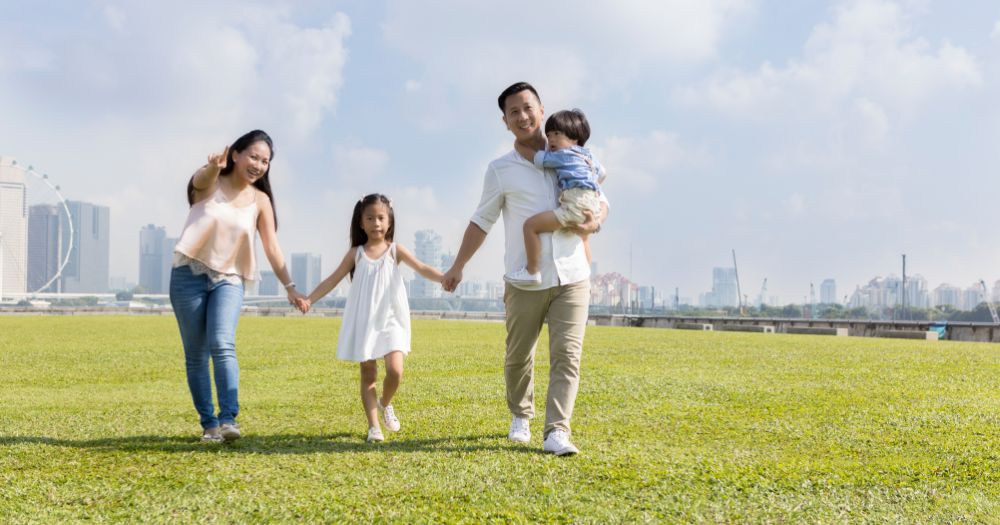Singapore is facing the "twin demographic challenges" of a persistently low fertility rate and an ageing population, said Minister in the Prime Minister's Office (PMO) Indranee Rajah in parliament on Feb. 28, 2024.
She said that Singapore’s resident total fertility rate has dropped below 1.0, with preliminary estimates showing that the total fertility rate fell to 0.97 in 2023.
This is a further decline from the previous record of 1.04 in 2022 and 1.12 in 2021.
She said there is a need to support Singaporeans in starting and raising families.
"A strong Singapore citizenry is the bedrock and wellspring of a thriving nation,"
Reasons for low fertility rates
Indranee gave reasons for the country's low fertility rate.
One example she gave was that couples who have had their marriage plans disrupted by the pandemic have, in turn, delayed their parenthood plans.
She cited other reasons like concerns about the financial costs of child-raising, pressures to be an excellent parent, or difficulties managing work and family commitments.
"More broadly, though, our low fertility reflects a global phenomenon where individual priorities and societal norms have shifted," she said.
Making conducive environment for couples to grow families
On how the government will support marriage and parenthood, Indranee said that they will provide a "conducive environment" for couples who wish to start and nurture families.
She pointed to the recent doubling of government-paid paternity leave to four weeks on a voluntary basis as one way they are supporting working parents.
To aid young families financially, the government has also enhanced the baby bonus cash gift for all birth orders, she added.
Noting feedback from parents that care needs for a child are greatest during their first 18 months, she shared the government's plans to grow childminding services as an additional infant care option for families.
Indranee said that the government is also looking at how paid parental leave can be increased.
This requires "workplace adjustments", and employers may face "challenges in making arrangements" to cover for employees’ extended absences, she added.
"We will, therefore, closely engage tripartite partners on further enhancements and pace out any proposed changes," Indranee added.
Flexible work arrangements
Indranee also shared the government's plans to explore "sustainable ways" like flexible work arrangements to help parents better manage work and family commitments.
Saying that employers' ability to meet business needs will be "critical in sustaining such flexibility", she noted that some companies like small- and medium-size enterprises (SMEs) may find it “more challenging” to adopt flexible work arrangements.
She said the government will consider ways to help all employers "implement flexible work arrangements well" and "manage their teams productively".
“Ultimately, it will require a whole-of-society effort to build the family-friendly workplace culture that members have called for,” she added.
Helping seniors age well
On supporting the needs of an ageing population, Indranee said that a "key thrust" of Forward Singapore is enabling seniors to "age well".
"Therefore, we will step up the preventive health focus through Healthier SG to empower Singaporeans to live healthily with support from their regular family doctor," she said.
She also pointed to the government's Age Well SG initiative, aimed at helping seniors age well in their homes and community.
Through the programme, the government will improve support for seniors with care needs and make "homes and neighbourhoods more senior-friendly", she said.
New citizenships to mitigate low birth rates and ageing
To mitigate the impact of low birth rates and ageing on the economy and society, Singapore's immigration policies play an "important role", Indranee said.
She shared that Singapore granted about 23,500 new citizenships, including around 1,300 children born overseas to Singaporean parents in 2023.
They also granted another 34,500 new permanent residencies (PR), she added.
She explained that PR or citizenship are granted to those who can "integrate well, contribute to Singapore, and are committed to making Singapore their home".
"We continue to maintain a measured and stable pace of immigration, which moderates the impact of demographic trends on the size and age profile of the citizen population," she said.
Providing support for aspiring mothers aged above 40
Member of Parliament Hany Soh asked Indranee about the government co-funding scheme for assisted conception procedures.
Noting the government's rationale for providing "better subsidy schemes" for those who are below 40 years old, Soh asked if the government can exercise flexibility in providing additional funding for those who have tried and failed in their attempts to conceive a child through in-vitro fertilisation.
Indranee said she understands that there are people who were not able to "try for children earlier" and noted that age "remains a factor" and "affects the success or the outcomes".
"We can certainly look at it and study it," she said, adding that if technology gets better and there are advances and improvements in medical science, they can see "how that can be done".
"We will do our utmost, but at the same time, just to remember, age is a factor, so where possible, if we can encourage Singaporeans to have children earlier, that would be really the best solution," she said.
Top photo from Canva
If you like what you read, follow us on Facebook, Instagram, Twitter and Telegram to get the latest updates.



